SMOKEFALL GETS IN YOUR EYES
It opened a year ago in Goodman’s smaller Owen Theatre. Due to rave reviews and popular demand, it’s now the fall opener in the larger Albert enclave. Clearly, Noah Haidle’s Smokefall struck a lot of nerves and vital organs. Its funky fame can put a critic who missed its 2013 debut on the defensive, considering that this is the same cast (although Kevin Depinet’s sprawling and collapsing expressionistic set has more room to range).
So, does this Emperor wear any clothes?
No question, there’s a cumulative confessional power and a manic magic realism behind Haidle’s damaged family in Grand Rapids, Michigan. In Annie Kauffman’s truth-telling staging, we observe these lovable losers across a century and three generations. But with his meta-theatrics and juxtaposed chronology, Haidle shows a betrayal to a novelistic sweep (most obvious in the insistent narration) and an insensitivity to the cultural shifts that affect this centrifugal family. (However far they travel, they mostly manage to come home, living or dead.) The script is alive to the permutations of transience, its unnamed clan acutely afraid of failure even as they court it. Thus, Haidle can make an apple tree stand for the Garden of Eden, a birth canal look like a roller-coaster, or a fetus named Johnny later recall a famous American seed planter.
But, like the much-praised August: Osage County, this cautionary tale about both living in the moment and connecting with the past doesn’t live on its own terms. Whereas Tracy Lett’s hit was almost legally indebted to such domestically driven classics as The Little Foxes, Long Day’s Journey Into Night, and Who’s Afraid of Virginia Woolf?, Haidle’s scavenging style and structure owe a ton to Our Town, The Skin of Our Teeth and The Time of Your Life. No question, these are fine models for bittersweet family sagas about survival and sacrifice, but that was then and this is now. If not the odor of mendacity, this chameleon-like Smokefall lacks the thrill of the unknown. It carries a déjà vu that makes suspect its seeming spontaneity.
The first act hews mostly to the present (which is utterly abandoned by the time-traveling second half). Set on a seminal wedding anniversary, it presents, straight-forwardly at first, the usual suspects in family dysfunction: Daniel (Eric Slater), the frustrated, insecure, and soon-to-flee dad á la Glass Menagerie; the ethically and physically expectant wife (Katherine Keberlein), very pregnant with two boys; the gratuitously troubled, willfully mute daughter Beauty (Catherine Combs); and the tritely senile, 77-year-old gramps (the wonderful Mike Nussbaum, fully enjoying life and art at a sprightly 90-years young).
Then there are the twin boys in the uterus (“Tough womb!”) who, just before birth, engage in terminally hip vaudeville jocularity about their future: Their precious and precocious patter, a blatant homage to Christopher Durang, includes singing “Send in the Clowns,” and observations about genetic sequencing and Foucault. But then on a dime this family can break into very self-aware, ostentatiously glib speculations about original sin, predestination, God’s existence, travel as freedom, and, above all, whether they’re all “past saving.” (Not quite, seems the tentative reply.)
Portentously narrating the action, with spoilers to spare, is the ever-foreshadowing “Footnote” guy (a smoothly impassive Guy Massey). He dutifully delivers announcements of fuck-ups past and future; not with compassion to spare like Thornton Wilder’s Stage Manager, but, it seems, just because he knows it all. And after just one of the boys is born alive, the entire stage self-destructs. Why the contrivance? Because this is what Goodman and Steppenwolf (Head of Passes) can afford to do.
In the screwball second act, set in a very flexible future, Nussbaum, no longer pixielike and addlepated, now plays the surviving twin, busily berating his son Johnny (Massey) for assorted shortcomings. He’s visited by the memory of his mother’s first date with dad, as well as an actual Beauty, now 95 and having wandered for 74 years to find the father who also abruptly left home to return to his true sweetheart in San Francisco just before he died. Delivering a very long travelogue monologue, she’s back to bury his bones; and it really seems important here just what part of the back yard in which he’ll be planted. The oracle-bearing narrator lurches back to tell us about assorted unedifying coming events that the playwright would rather tell than show.
Apart from the derivative dramatic detritus borrowed or stolen from better works, what’s both intriguing and frustrating about this alternately sentimental (the apple tree becomes a Hallmark card!) and pessimistic play (we’re all doomed but timing rather than ripeness is all!) is how eager it is to please any soul-set. There’s enough reductionist and manipulative fare to satisfy solipsists, existentialists, evangelicals, and sitcom fans. The moral can be anything you like—the virtues of sacrifice, frictions of marriage, tyranny of false expectations, the dispiriting illusion of free will, the power of hope against fate—much ado or what you will.
Whatever the random harvest, no doubt Kauffman and her cast serve a supple, slick script very well. They manage to find the charm in contradictions, the rewards in arbitrary plot twist, and the toughness in love. For many theatergoers and the majority of critics, that’s payoff enough. Others are finicky and ornery enough to want originality.
photos by Liz Lauren
Smokefall
Goodman Theatre
170 North Dearborn
scheduled to end on October 26, 2014
for tickets, call 312.443.3800 or visit www.GoodmanTheatre.org
for info on other Chicago Theater, visit www.TheatreinChicago.com
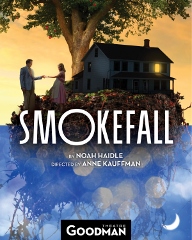
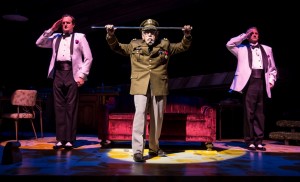
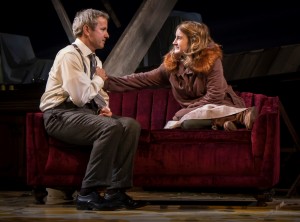
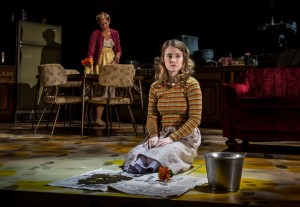
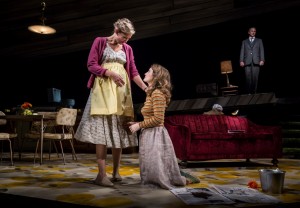
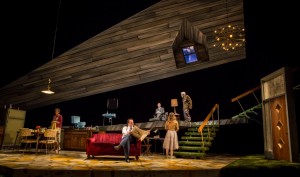
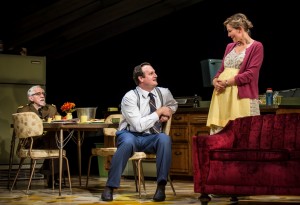
{ 2 comments… read them below or add one }
Yours is usually the review I most respect. Not this time. It is not a review, but rather a catalogue of the plays you’ve seen. Disappointing.
A brilliant and insightful piece of – dare we say it – criticism. Whereas other reviewers stopped with praise, you asked needed questions and insightfully named Smokefall’s shortfalls.